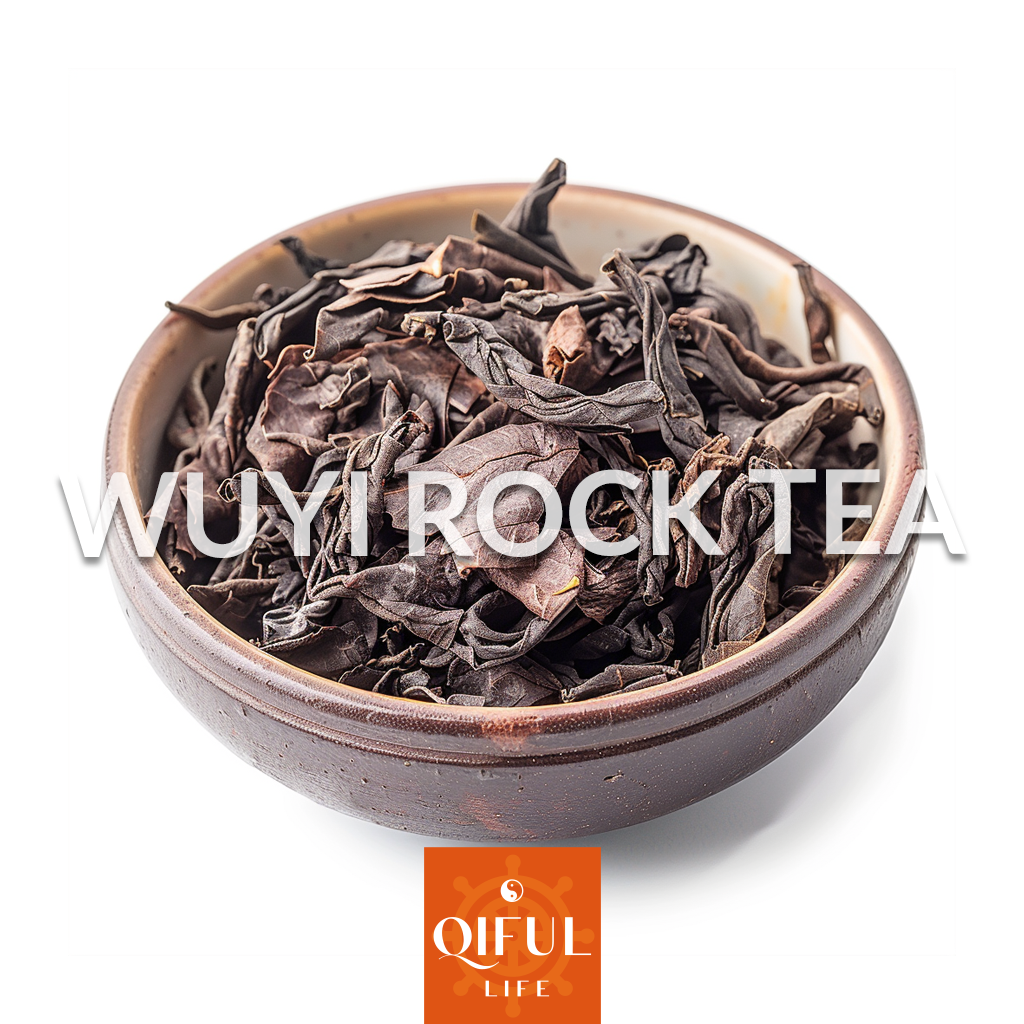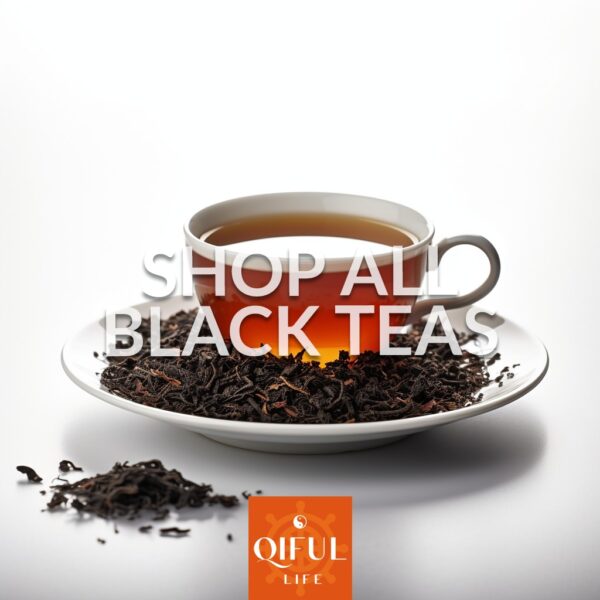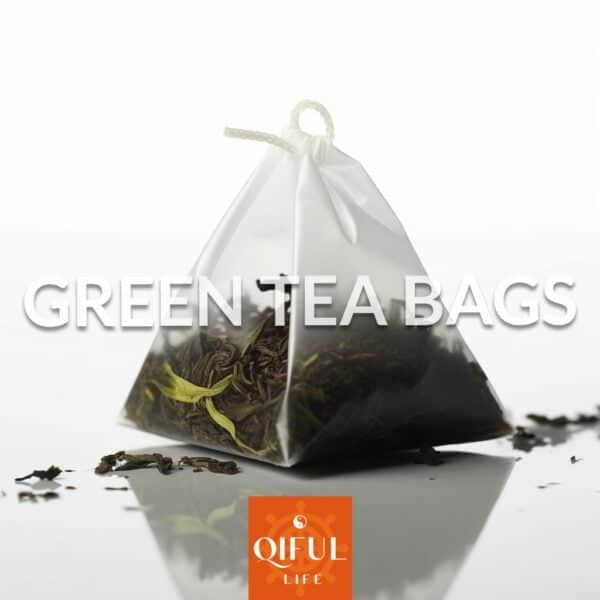Wuyi Rock Tea refers to tea grown in the Wuyi Mountains of Fujian. Its name is synonymous with Rock Tea and refers to Oolong tea produced in the region. Wuyi Rock Tea is also known as “Yan Cha” or 岩茶 in Chinese.
There are more than 800 kinds of rock tea varieties found in the Wuyi Mountains. The teas are regarded as the best tasting and most unique Oolongs from China. Most tea connoisseurs regard Rock Tea as the best tasting Oolongs in the world.
Types of Rock Tea from the Wuyi Mountains
Type of Wuyi Rock Tea Chinese Name (Simplified)
Da Hong Pao 大红袍
Shui Xian 水仙
Tie Luo Han 铁罗汉
Bai Ji Guan 白鸡冠
Rou Gui 肉桂
Qi Lan 奇兰
Mei Zhan 梅占
Lao Cong Shui Xian 老枞水仙
Huang Guan Yin 黄金观音
Ba Xian 八仙
What Makes Wuyi Rock Tea so Special?
Mountains
Tea fields grow in between and at the base of the mountains in Wuyi. This unique growing environment lends itself to mineral rich soil, streams, and rainfall.
Soil Composition
Wuyi Mountains is the lowest acidic tea growing region in the world. Its mineral rich, red clay creates tea that is alkaline and easy on the stomach. The quality soil allows for the rich and mineral like flavor produced in the teas.
Water Flow
Natural mountain water streams flow down into most tea crops. Locals actually drink the water directly from the stream. The water sources atop the mountains are distant from any sort of roads or pollution.
Moss
Pictured below is a healthy moss that grows on tea tree stems. The purity of this steeps into the tea leaf stems, which the locals say contributes to the purity of the tea.
Wuyi Rock Tea Types
The 3 most popular Rock Teas from the Wuyi Mountains are Da Hong Pao (Big Red Robe), Tie Luo Han (Iron Monk) and Rou Gui (Cinnamon).
Big Red Robe
The most famous of all the teas at Wuyi Mountains is Da Hong Pao, otherwise known as Big Red Robe. This is a light to medium oxidized Oolong with levels ranging from low to ultra-high grade. The most gourmet selections grow deep within forest environments and are typically from old tea trees. All low grade selections derive from tea trees less than 2-3 feet in height and are machine plucked.
Iron Monk
Iron Monk is a heavy oxidized Oolong that dark amber and slightly purplish in color. Most Iron Monk selections require old tea trees to bring out the full flavor and aroma. This selection is known for producing a particularly strong returning sweetness taste.
Rou Gui
Rou Gui is the most prized possession amongst locals. Although Da Hong Pao is the most famous, Rou Gui is actually the most complex in flavor and most difficult overall to grow. Its multi flavor notes of spice, cinnamon and fruit make it one of the most unique Oolongs on earth.
While there are many other varieties, most farmers focus on selling these 3 due to breadth of taste, popularity, and production control. Two other popular varieties among locals include Qi Lan and Lao Shui Xian.
Growing Regions within Wuyi Mountains
The most renown area within the Wuyi Mountains is Niulankeng. Although there are dozens of main tea growing developments, the most coveted is this area. Located on the far western part of the mountain area, it is the farthest from any roads, hotels or other developments. To no coincidence, it has the most lush and healthy crops in the area. While visiting, we were in awe at how green the environment was compared even to other healthy growing areas with the mountain region. Niulankeng has some of the oldest tea trees and is most coveted for its Rou Gui.
The Development of Yan Cha in the Wuyi Mountains
In recent years, farmers have begun creating Lapsang Souchong in the area. Unlike traditional Lapsang Souchong, this Wuyi Mountain black tea is low acidic and highly fragrant. Instead of a smoky flavor, it has notes of high mountain tea that is fresh, slightly sweet, and highly fragrant. It is one of the most underrated black teas in the world in our opinion.
However, this development has not led to black tea as being classified as Rock Tea. Rock Tea implies Oolong, specifically Oolong from Wuyi Mountains, despite efforts to grow other tea varieties in the region.
Other Information on the Wuyi Mountains
The Legend of Da Hong Pao
Legend has it that in ancient times, a scholar who went to the capital city to take an examination fell ill while passing Mount Wuyi. He was greeted by a monk of the Tianxin Temple nearby who used tea as medicine. This allowed the scholar to go on to take part in the imperial examination of which he obtained the highest certification as a qualified number one scholar. As a token of gratitude, the scholar returned to Mount Wuyi and put his royal granted red robe (Da Hong Pao in Chinese) on the tea tree, hence the name “Da Hong Pao”.
Because “Da Hong Pao” can also mean “thanksgiving” and “praying”, the custom of shouting tea, worshiping tea, offering tea and serving tea has formed in Mount Wuyi.
Other Info
While visiting the Wuyi Mountains, we came across the following information at the park: “In the Earth’s ecosystem, 27 degrees north latitude is dotted with biological restricted zones. However, Mount Wuyi National Park, located at the same latitude, has the most typical, largest, and best preserved mid-subtropical native forest biological system of the same latitude in the world. It is a key area for global biodiversity conservation. This stone perfectly presents the biodiversity of Mount Wuyi. The vegetation on various stones shows the whole process of succession from lower plant communities to higher plant communities. From lichen (600 million years ago Paleozoic plants) to moss (400 million years ago Middle Cambrian plants), from moss to herbaceous (164 million years ago Jurassic plants), and from herbaceous to woody, it is known as a textbook and living fossil of biological evolution.”
FAQ
What Does Wuyi Rock Tea Taste Like?
Wuyi Rock Tea taste ranges from medium oxidized mineral flavor with returning sweetness to heavy oxidized, deep bold flavoring. All of the teas have notes of minerals and are light on the stomach due to the low acidic composition found in the soil.
High quality rock tea should produce saliva in the mouth, which is a highly positive attribute when it comes to gourmet teas. This phenomenon is particularly unique to the Wuyi region due to all the mountain water streams flowing into the region.
A Step by Step Guide to Experiencing Wuyi Rock Tea
- Although Rock Tea is considered the most premium Oolong in China and throughout most of the world, it is subject to low grade selections. Farmers do prioritize mass quantity and lower pricing in order to drive their revenue. It is important to test out various farmers and understand their crops to understand the tea quality.
- A good Wuyi Mountain Yan Cha should have good Qi. When you drink it, most people can feel the nutrient energy from the leaves, stems and soil circulate throughout the body. This is a phenomenon known as Cha Qi.
- Search for selections from Niulankeng or Matou. The locals view both areas as the most pristine growing environments.




